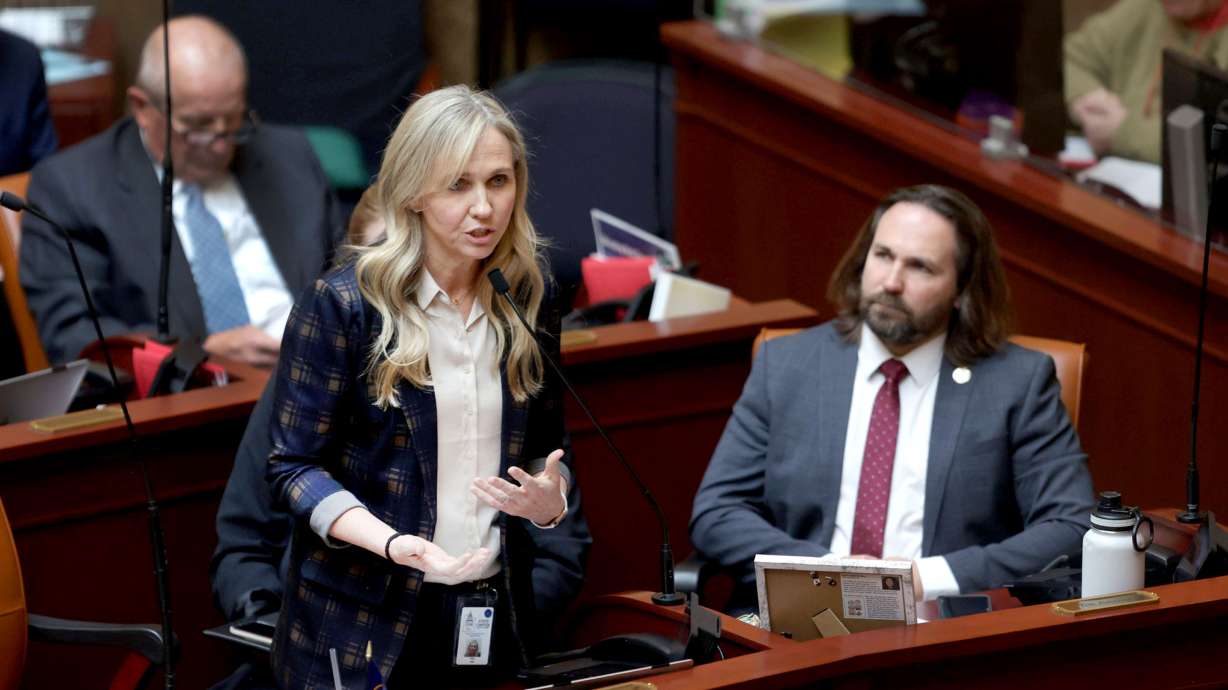Estimated read time: 4-5 minutes
This archived news story is available only for your personal, non-commercial use. Information in the story may be outdated or superseded by additional information. Reading or replaying the story in its archived form does not constitute a republication of the story.
SALT LAKE CITY — The Utah House approved the proposal revamping diversity, equity and inclusion programs at the state's public universities on Friday, splitting along partisan lines.
Now the measure — which generated strong sentiments from both supporters and opponents — goes to the Senate for consideration. HB261 passed in a 58-14 vote with all Republicans present in support of the measure and all 14 House Democrats voting "no." Three lawmakers did not vote.
Proponents, including Rep. Katy Hall, the bill's sponsor, touted the measure as a step forward in preventing discrimination. Among other things, the measure would prohibit the state's public universities from providing certain programming meant specifically to assist students in certain demographic groups, first-generation Black students, say. Such programming — meant to help certain student groups succeed in the university setting — would instead have to be open to all students.
"This bill is focused on removing barriers for all students and all Utahns who overcome adversity through hard work, initiative and talent," Hall, R-South Ogden, said during Friday's hearing. The measure would not lead to the closure of cultural centers, she said, and it wouldn't end programming for students "who need extra services for their academic successes, including those who are already receive services."
Rep. Karianne Lisonbee, R-Clearfield, sounded a similar message, invoking the Civil Rights Act of 1964, the federal measure that prohibited discrimination in public places and outlawed discrimination in the job place. "What this bill does is, it says we want to treat all people equal. If we believe that the Civil Rights Act was a good thing and that we want to end intolerance and discrimination in Utah and in America, then vote for this bill," she said.
As debate intensifies around the country over diversity, equity and inclusion programs — aimed at assisting students of color and other groups that have historically faced marginalization — HB 261 generated strong pushback from the House's Democratic minority.
Rep. Angela Romero, D-Salt Lake City, noted she benefitted from a program as a student at the University of Utah. She said the Center for Ethnic Student Affairs was specifically geared to students of color. Growing up in Utah and experiencing racism, she said it helped to know "I wasn't the predominant religion and because of the color of my skin, I knew I had a place that I could go to where I felt safe."
She expressed concern with the scope of the bill and its intent to treat all groups of students similarly.
"There's unintentional consequences when we just try to sweep things and say we're all the same, because we're not. There's still a lot of things that have to change in this country for us all to be on a level playing field," said Romero. Passing the bill, she went on, sends a message "that (minorities) don't matter."
Rep. Joel Briscoe, D-Salt Lake City, said discrimination still occurs. In arguing against HB261, he said passing legislation that purports to treat everyone equally doesn't mean such an objective will be attained.
"We do not live in a post-racial society. We do not live in a race-neutral society," he said. Passing laws that "say we're going to treat everyone the same doesn't mean it's going to happen."
Aside from broadening the scope of diversity, equity and inclusion programs at universities to all students, the measure would prevent use of the "diversity, equity and inclusion" wording in naming of such initiatives. Hall's measure rebrands them as "student success and support" offices or divisions.
Hall's measure would also prohibit universities and state and local government units from asking job applicants so supply "diversity statements," statements meant to gauge their thoughts on diversity programming.
Significantly, HB261 — coming amid concerns from some conservatives that their voices can be drowned out in the university setting — also aims to foster "academic freedom" on Utah's college campuses. Universities would be required to offer annual training to faculty and staff "on academic freedom and freedom of speech in accordance with state or federal laws," the bill reads.
"Professors have expressed worry about their students and their profession as they've seen a decline in student engagement and (an) environment where so many are afraid to speak up for fear of losing their jobs, getting censored, being harassed or getting doxxed," Hall said. University employees have told her "there's little diversity of viewpoint within the faculty and virtually no willingness to hire anyone who won't think as the same as the majority view."
The bill has quickly moved along, getting committee support on Wednesday and House backing just two days later. The 2024 legislative session began Tuesday.









